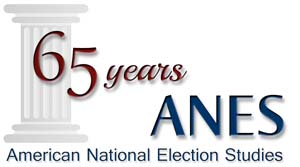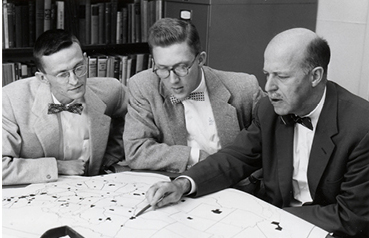This is a guest post written by W. Phillips Shively, Professor of Political Science at the University of Minnesota.
 This post is part of a series celebrating the 65th anniversary of the American National Election Studies (ANES). The posts will seek to highlight some of the many ways in which the ANES has benefited scholarship, the public, and the advancement of science. Do you have ideas for additional posts? Please contact us by email ([email protected]) or Twitter (@umisrcps).
This post is part of a series celebrating the 65th anniversary of the American National Election Studies (ANES). The posts will seek to highlight some of the many ways in which the ANES has benefited scholarship, the public, and the advancement of science. Do you have ideas for additional posts? Please contact us by email ([email protected]) or Twitter (@umisrcps).
First and foremost, I can’t really separate ANES, especially in its earliest and most exciting time, from Philip Converse, Donald Stokes, and Warren Miller. Though the large, ongoing dataset is seen as their legacy, it was actually a byproduct of their greatest contribution (after all, there were other large surveys being done at the time, but only theirs became institutionalized like ANES). Their real contribution was research that was breathtakingly creative and rigorous for its time. In the 1960s, when I was in graduate school, they were my gods; if he had ever had a poster, Phil Converse would have been on my dormitory room wall. They pioneered considering the interaction of data from different levels of social organization, analyzing the interplay of historical change and individual behaviors, and applying data analysis to democratic theory. The ANES data set came to be of such importance in the field because they demonstrated the beautiful things that could be done with it.
The high point of my graduate studies was a secondary analysis of the 1956 and 1960 national election studies, to test for various processes by which individuals were influenced in their voting by their community (i.e., an early and very primitive study of contextual effects.) This was pre-computer, so I did it all with IBM cards and a card sorter. It was the most exciting thing I did in graduate school, yet all I was doing was imitating Miller, Converse, and Stokes.
In more recent years, ANES made a huge contribution when Steven Rosenstone took the lead in setting up the ambitious Comparative Study of Electoral Systems (CSES), a cooperative study involving roughly fifty national election studies. He was able to build on years of cooperation between the ANES and international scholars, started especially by Stokes and Converse.
While the Inter-University Consortium for Political and Social Research (ICPSR) now serves a broad inter-disciplinary audience, it was initially a spin-off of the ANES. I attended the summer program in its second year, 1965. It consisted of a single class, co-taught by Stokes and Converse. Each day they opened some exciting new window for us. One day, Stokes introduced us to the problem of cross-level inference, which he had just started work on; I had never heard of it before, and it would become an important part of my work over the next fifty years. Another day they invited a young sociology graduate student, Gudmund Iversen, to come in and talk to us about an interesting new kind of statistics he had just learned of – Bayesian statistics.


